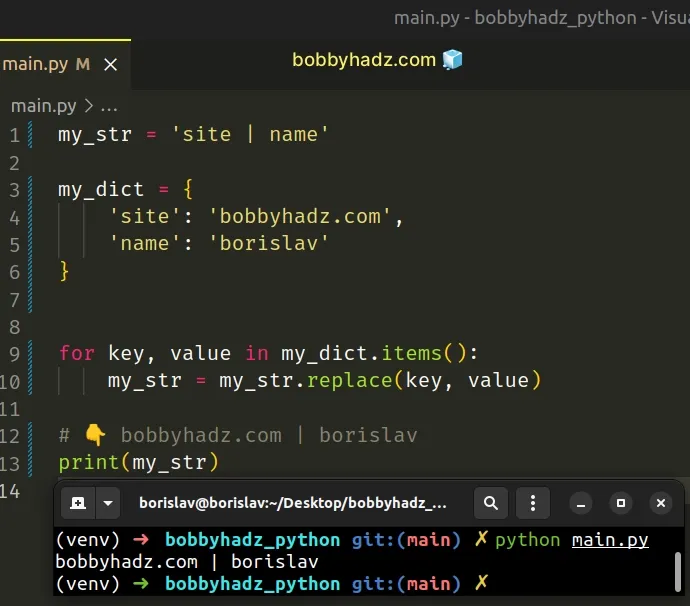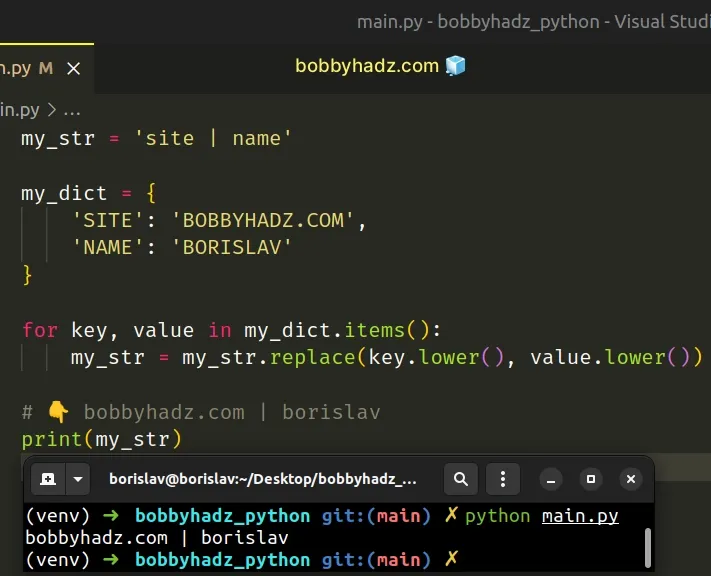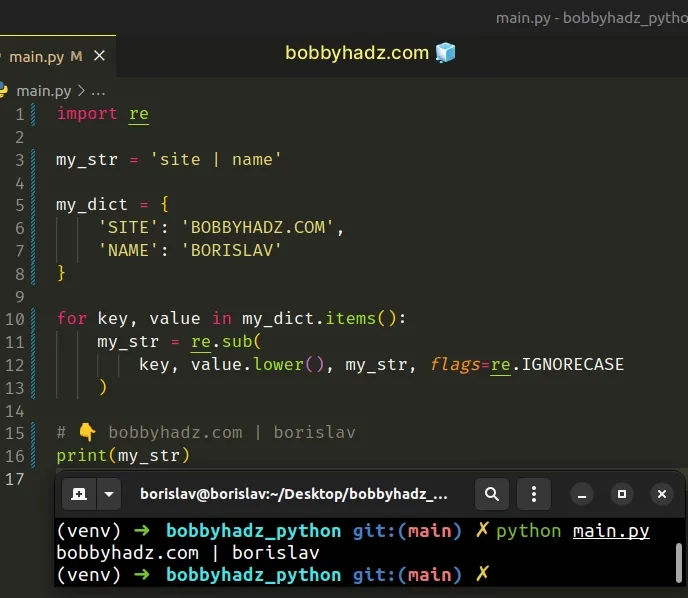Replace words in a String using a Dictionary in Python
Last updated: Apr 9, 2024
Reading time·3 min

# Table of Contents
- Replace words in a String using a Dictionary in Python
- Converting the keys or values of the dictionary to lowercase
- Replace words in a String using a Dictionary with re.sub()
# Replace words in a String using a Dictionary in Python
To replace words in a string using a dictionary:
- Use a
forloop to iterate over the dictionary's items. - Use the
str.replace()method to replace words in the string with the dictionary's items. - The
str.replace()method will return a new string with the matches replaced.
my_str = 'site | name' my_dict = { 'site': 'bobbyhadz.com', 'name': 'borislav' } for key, value in my_dict.items(): my_str = my_str.replace(key, value) # 👇️ bobbyhadz.com | borislav print(my_str)

We used a for loop to iterate over the dictionary's items.
The dict.items() method returns a new view of the dictionary's items ((key, value) pairs).
my_dict = { 'site': 'bobbyhadz.com', 'name': 'borislav' } # 👇️ dict_items([('site', 'bobbyhadz.com'), ('name', 'borislav')]) print(my_dict.items())
On each iteration, we use the str.replace() method to replace substrings in
the string with values from the dictionary.
my_str = 'site | name' my_dict = { 'site': 'bobbyhadz.com', 'name': 'borislav' } for key, value in my_dict.items(): my_str = my_str.replace(key, value) # 👇️ bobbyhadz.com | borislav print(my_str)
The str.replace() method returns a copy of the string with all occurrences of a substring replaced by the provided replacement.
The method takes the following parameters:
| Name | Description |
|---|---|
| old | The substring we want to replace in the string |
| new | The replacement for each occurrence of old |
| count | Only the first count occurrences are replaced (optional) |
The method doesn't change the original string. Strings are immutable in Python.
# Converting the keys or values of the dictionary to lowercase
Use the str.lower() method if you need to convert the dictionary's keys and
values to lowercase.
my_str = 'site | name' my_dict = { 'SITE': 'BOBBYHADZ.COM', 'NAME': 'BORISLAV' } for key, value in my_dict.items(): my_str = my_str.replace(key.lower(), value.lower()) # 👇️ bobbyhadz.com | borislav print(my_str)

The str.lower() method returns a copy of the string with all the cased characters converted to lowercase.
# Replace words in a String using a Dictionary with re.sub()
You can also use the re.sub() method to replace words in the strings using the
dictionary's items in a case-insensitive manner.
import re my_str = 'site | name' my_dict = { 'SITE': 'BOBBYHADZ.COM', 'NAME': 'BORISLAV' } for key, value in my_dict.items(): my_str = re.sub( key, value.lower(), my_str, flags=re.IGNORECASE ) # 👇️ bobbyhadz.com | borislav print(my_str)

The re.sub() method returns a new string that is obtained by replacing the occurrences of the pattern with the provided replacement.
Notice that we set the re.IGNORECASE flag to ignore the case when matching
words in the string.
I've also written an article on how to replace values in a dictionary.
# Additional Resources
You can learn more about the related topics by checking out the following tutorials:
- Replace First or First N characters in a String in Python
- Replace the Last or Last N characters in a String in Python
- Replace the Last or Nth occurrence in String in Python
- How to replace multiple Characters in a String in Python
- Replace multiple spaces with a single space in Python
- Python: replace Single with Double Quotes in String or List
- How to replace Spaces with Underscores in Python

